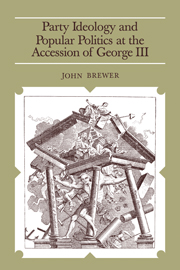Book contents
- Frontmatter
- Contents
- Preface
- A note to the reader
- PART I INTRODUCTION
- PART II THE RECONFIGURATION OF POLITICS
- 3 Whig and tory
- 4 Opposition and the proprietary parties
- 5 From Old Corps to Rockinghamite whigs: the emergence of a party
- 6 Pitt and patriotism: a case study in political argument
- 7 Ministerial responsibility and the powers of the Crown
- PART III AN ALTERNATIVE STRUCTURE OF POLITICS
- PART IV FOCUSSED RADICALISM
- PART V TWO POLITICAL NATIONS
- PART VI CONCLUSION
- Notes
- Bibliography
- Index
7 - Ministerial responsibility and the powers of the Crown
Published online by Cambridge University Press: 15 December 2009
- Frontmatter
- Contents
- Preface
- A note to the reader
- PART I INTRODUCTION
- PART II THE RECONFIGURATION OF POLITICS
- 3 Whig and tory
- 4 Opposition and the proprietary parties
- 5 From Old Corps to Rockinghamite whigs: the emergence of a party
- 6 Pitt and patriotism: a case study in political argument
- 7 Ministerial responsibility and the powers of the Crown
- PART III AN ALTERNATIVE STRUCTURE OF POLITICS
- PART IV FOCUSSED RADICALISM
- PART V TWO POLITICAL NATIONS
- PART VI CONCLUSION
- Notes
- Bibliography
- Index
Summary
The friends of Lord B[ute] and of the ministry, which succeeded, were for preserving to the crown the full exercise of a right, of which none disputed the validity, that of appointing his own servants. Those of the opposition did not deny this power of the crown, but they contended that the spirit of the constitution required, that the crown should be directed to the exercise of this public duty by public motives, and not by private liking and friendship. That great talents, great and eminent services to the nation, confidence amongst the nobility, and influence amongst the landed and mercantile interests, were the directions, which the crown ought to observe in the exercise of its right in nominating officers of state. The observation of this rule would, and, they were of opinion, nothing else could, in any degree, counterballance that immense power, which the crown has acquired by the gift of such an infinite number of places.
(Annual Register (1763), 41)Nearly all eighteenth-century political commentators saw the relations between the king and his ministers in terms of the two concepts of ministerial responsibility and the royal prerogative. Not surprisingly, therefore, these notions provided the ideological framework for the notorious struggle between George III and the politicians. This conflict is incomprehensible without a working knowledge of what contemporaries understood by these two loosely defined, generic categories, and without a rigorous examination of the way in which they were employed.
- Type
- Chapter
- Information
- Publisher: Cambridge University PressPrint publication year: 1976



